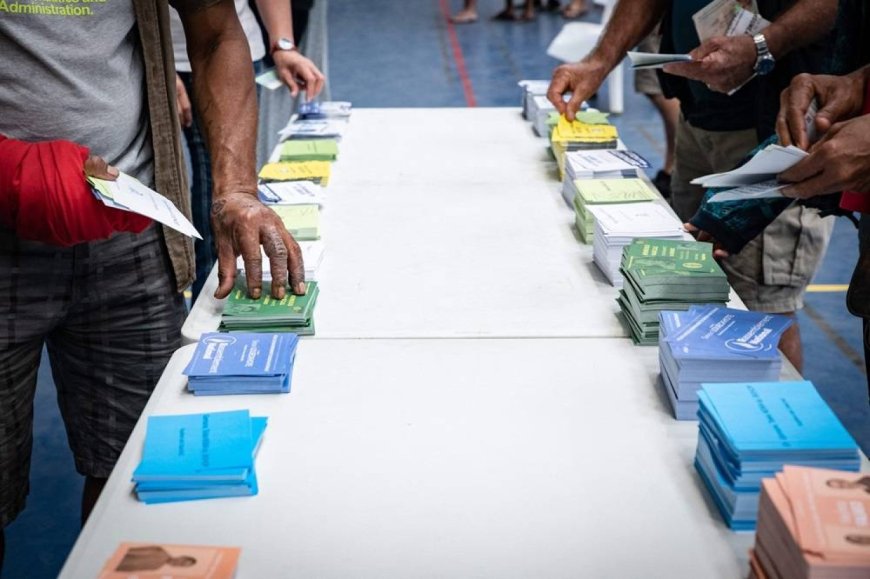France’s High-Stakes Election Begins: Far-Right Leads in Preelection Polls

French voters began casting ballots Sunday in the first round of a critical early parliamentary election, potentially paving the way for the country’s first far-right government since the Nazi occupation during World War II.This two-round election, culminating on July 7, is poised to significantly influence European financial markets, Western support for Ukraine, and the management of France’s nuclear arsenal and global military presence.
Amid rising inflation and economic woes, many French citizens have grown disillusioned with President Emmanuel Macron’s leadership, perceiving it as detached and elitist. Marine Le Pen’s National Rally, a far-right, anti-immigration party, has capitalized on this discontent, leveraging platforms like TikTok to gain substantial support in preelection polls.
Opposing Macron’s pro-business centrist alliance, Together for the Republic, is the newly formed left-wing coalition, the New Popular Front. This alliance, comprising the French Socialists, Communists, and the hard-left France Unbowed party, has promised to reverse unpopular reforms such as the pension law that raised the retirement age from 62 to 64.
Nearly 49.5 million registered voters will elect 577 members to the National Assembly, the influential lower house of parliament. Early reports indicate a higher turnout compared to the 2022 legislative elections, with midday participation at 25.9%, up from 18.43%.
Macron, alongside his wife Brigitte, cast his vote in Le Touquet, while Le Pen voted in her northern French stronghold. The timing of the election, coinciding with the start of summer vacations, has resulted in a significant increase in absentee ballot requests.
Polling stations will close at 8 p.m. (1800 GMT), with early projections expected shortly thereafter and official results later in the night.
Historic Context and Voter Sentiments
The current election is viewed as one of the most consequential since World War II, potentially ushering in a government led by nationalist, far-right parties. The last time France experienced such political turbulence was during the Vichy regime under Nazi occupation.
In Paris, voters expressed concerns ranging from immigration to economic instability. Cynthia Justine, 44, emphasized the importance of voting amidst the “rising hate speech” and societal division. As a Black woman, she highlighted the significance of exercising her right to vote, a right historically denied to many.
Pierre Leclaer, 78, voted to prevent a far-right government, fearing a populist administration that would threaten France’s liberal and republican values. Macron’s decision to call early elections followed his party’s defeat in the European Parliament elections to the National Rally, a party historically linked to racism, antisemitism, and hostility toward France’s Muslim community.
Macron’s gamble aims to mobilize moderate voters to prevent a far-right takeover. However, polls suggest that the National Rally, under the leadership of 28-year-old Jordan Bardella, could achieve a parliamentary majority. If this occurs, Macron would be compelled to appoint Bardella as prime minister, leading to a cohabitation that would weaken Macron domestically and internationally.
Potential Impact and Historic Implications
The election’s outcome will reveal voter sentiment but not necessarily the final makeup of the National Assembly due to France’s complex voting system and potential inter-party alliances. Historically, such maneuvers have prevented far-right victories, but Le Pen’s party has gained widespread support.
Bardella’s lack of governing experience contrasts sharply with his ambitious agenda, including halting military aid to Ukraine and restricting citizenship rights for French-born individuals with dual nationality. Critics argue these policies undermine fundamental human rights and democratic ideals.
Significant public spending promises by the National Rally and the left-wing coalition have raised concerns about France’s debt, already under scrutiny by EU watchdogs.
In New Caledonia, a French Pacific territory, polls closed earlier due to a curfew extended following violent unrest. The conflict stemmed from proposed constitutional amendments perceived as marginalizing the Indigenous Kanak population, who seek independence from France.
Voters in France’s overseas territories, including Saint-Pierre-et-Miquelon, Saint-Barthélemy, Saint-Martin, Guadeloupe, Martinique, Guyana, and French Polynesia, as well as those at embassies and consulates across the Americas, cast their ballots on Saturday.













































